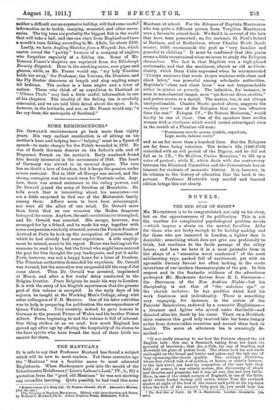SOME REMINISCENCES.*
De. OSWALD'S reminiscences go back more than eighty years. His very earliest recollection is of sitting on his mother's knee and helping her—" helping" must be a figure of speech—to make charpie for the Polish wounded in 1830. He was of South German descent on the father's side and of Huguenot French on the mother's. Early manhood found him keenly interested in the movements of 1848. The heart of Germany was stirred to an unusual degree. The race has no doubt a love of freedom, but it keeps the passion under severe restraint. But in 1848 all Europe was moved, and the strong contagion was too much even for Teutonic calm. Any- how, there was armed resistance to the ruling powers, and Dr. Oswald joined the army of freedom at Mannheim. He tells much that is interesting about his associates—we are ,a little surprised to find one of the Metternich family among them. Affairs seem to have been mismanaged, nor were all the allies of one mind. Dr. Oswald more than hints that on one occasion the Baden dragoons betrayed the cause. Anyhow, the anti-revolutionists triumphed, and Dr. Oswald was arrested. His escape, however, was arranged for by a friend, and he made his way, together with some companions similarly situated, across the French frontier. Arrived at Paris he took up the occupation of journalism, of which he had already had some experience. A side employ- ment he missed, much to his regret. Heine was looking out for someone to read to him, but the friend who might have secured the post for him thought the pay inadequate, and put it aside. Paris, however, was not a happy home for a lover of freedom. The Prussian authorities demanded his expulsion. Dr. Oswald was warned, but the execution was suspended till the coup d'aat came about. Then Dr. Oswald was arrested, imprisoned at Muss, and after a few weeks' delay conducted to the Belgian frontier. From Belgium he made his way to London. It is with the story of his English experiences that the greater part of this volume is occupied. In the early days of his sojourn he taught at the Working Men's College, along with other colleagues of F. D. Maurice. One of his later activities was to help in preparing for publication the correspondence of Queen Victoria. Very recently, indeed, he gave lessons in German to the present Prince of Wales and his brother Prince Albert. From beginning to end the volume is full of interest. One thing strikes us as we read: how much England has gained age after age by offering the hospitality of its shores to the finer spirits who have found the land of their birth too narrow for them.


































 Previous page
Previous page